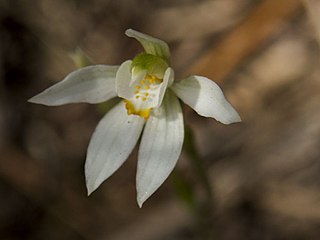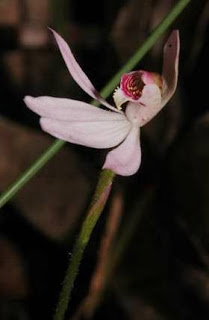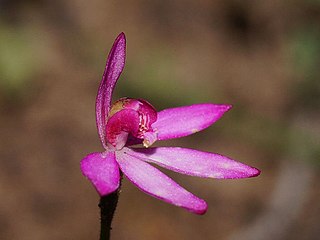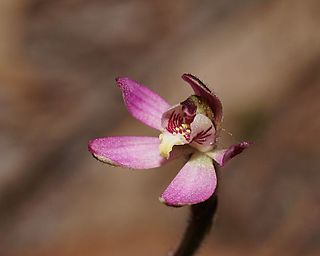Caladenia tonellii, commonly known as robust fingers, is a species of orchid endemic to Tasmania. It has a single, long, erect, hairy leaf and up to three bright pink flowers with brownish backs. It is a rare orchid which exists in low numbers.

Caladenia carnea, commonly known as pink fingers, is a plant in the orchid family Orchidaceae and is endemic to eastern and south-eastern Australia, including Tasmania. It has a single thin, green leaf and one to five white or pink flowers with red stripes and two rows of yellow-tipped "calli" on their labellum.

Caladenia picta, commonly known as painted fingers, is a species of orchid endemic to New South Wales. It has a single, sparsely hairy leaf and a single white or pink flower with a greenish-white back. Unlike many other caladenias, it flowers in autumn.

Caladenia fuscata, commonly known as dusky fingers, is a plant in the orchid family Orchidaceae and is endemic to eastern and south-eastern Australia, including Tasmania. It is a small ground orchid found in eucalyptus woodland and which flowers in September and October.

Caladenia aurantiaca, commonly known as orangetip fingers, is a plant in the orchid family Orchidaceae and is endemic to Victoria, although it is also found on one Bass Strait island. It is a slender ground orchid with a single hairy leaf and one or two short-lived, orange-tipped, white flowers on a thin, wiry spike.
Caladenia bartlettii is a plant in the orchid family Orchidaceae and is endemic to New Zealand. It is a ground orchid with a single narrow, hairy leaf and a thin wiry stem usually bearing one short-lived mauve to pink flower.

Caladenia catenata, commonly known as white caladenia, white fingers and lady's fingers, is a plant in the orchid family Orchidaceae and is endemic to New South Wales, Queensland and Victoria. It is a ground orchid with a single hairy leaf and one or two white, sometimes pink flowers on a thin, sparsely-hairy stem. It is similar to Caladenia carnea but lacks the red and white bars on the labellum of that species.

Caladenia curtisepala, commonly known as short-hooded fingers, is a plant in the orchid family Orchidaceae and is endemic to south-eastern Australia. It is a ground orchid with a single hairy leaf, and a single white to cream-coloured flower with a white labellum with red bands.

Caladenia gardneri, commonly known as the cherry spider orchid, is a species of orchid endemic to the south-west of Western Australia. It has a single, hairy leaf and up to three pale pink, sweetly scented flowers with a dark pinkish-red labellum.
Caladenia harringtoniae, commonly known as the pink spider orchid, is a species of orchid endemic to the south-west of Western Australia. It has a single, hairy leaf and up to three pale to deep pink flowers which have a cream-coloured labellum with a pink tip.

Caladenia hillmanii, commonly known as purple-heart fingers, is a plant in the orchid family Orchidaceae and is endemic to New South Wales. It is a ground orchid with a single leaf and one or two bright pink flowers with a reddish-purple labellum with darker bars.

Caladenia mentiens, commonly known as lesser fingers, is a species of orchid endemic to south-eastern Australia which grows singly, or in small, loose groups. It has a single, sparsely hairy, erect, linear leaf and a single whitish or pinkish coloured flower with a darker back and a cream-coloured labellum.

Caladenia ornata, commonly known as ornate pink fingers is a species of orchid endemic to Victoria. It has a single leaf and one or two bright pink flowers with greenish-pink backs, and a dark pink labellum with dark red bars.
Caladenia quadrifaria, commonly known as the large pink fingers orchid is a plant in the orchid family Orchidaceae and is endemic to New South Wales. It is a ground orchid with a single, sparsely hairy leaf and up to three pale to bright pink flowers.
Caladenia pumila, commonly known as the dwarf spider orchid is a plant in the orchid family Orchidaceae and is endemic to Victoria, Australia. It is a ground orchid with a single erect, hairy leaf and a single white flower with pale pink stripes. Its short flowering stem distinguishes it from other Victorian spider orchids. After 1933 it was presumed extinct until two plants were discovered in 2009.

Caladenia pusilla, commonly known as tiny fingers, pygmy caladenia, tiny caladenia or pink fingers, is a plant in the orchid family Orchidaceae and is native to Australia and New Zealand. It is a ground orchid with a single erect, sparsely hairy leaf and a single pink flower with a brownish-pink back. The flowers are short-lived and self-pollinating.

Caladenia stricta, commonly known as the upright spider orchid or rigid-combed spider-orchid is a plant in the orchid family Orchidaceae and is endemic to southern continental Australia. It is a ground orchid with a single leaf and usually only one pale green flower with red lines along the sepals and petals.

Caladenia valida, commonly known as the robust spider orchid, is a plant in the orchid family Orchidaceae and is endemic to south-eastern continental Australia. It is a ground orchid with a single sparsely hairy leaf and up to three white to cream-coloured flowers which sometimes have red streaks. It is similar to Caladenia reticulata but is large and taller with more stiffly spreading lateral sepals and petals.

Caladenia villosissima, commonly known as the hairy spider orchid, is a plant in the orchid family Orchidaceae and is endemic to Victoria. It is a ground orchid with a single densely hairy leaf and a single pale green flower with red stripes along the sepals and petals. It is a poorly known species and there is insufficient information about its distribution and abundance to determine whether or not it is endangered.
Caladenia gracillima, commonly known as pretty fingers, is a species of orchid endemic to eastern Australia. It has a single leaf and up to three bright pink flowers. The type specimen was collected at Yandina in southern Queensland but there are also records from southern New South Wales.














